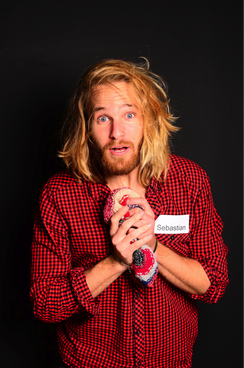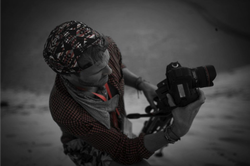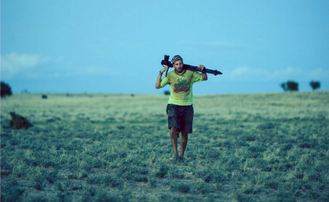
Region: Africa
Category: Filmmaking
I, Sebastian Per David Lindstrom, hail from Sweden where I served in the Swedish Military Special Forces, learning, among other things, how to survive in -30 degree Celsius weather. After the chilly winters of Sweden, I thawed, graduating from the University of Hong Kong's International Business and Global Management program. I have also consumed knowledge at educational institutions in Singapore, China and Korea. I’m the co-founder of non profit organizations and have become an integral part of several more globally-focused groups, including the Sandbox-Network. One such organization, Light for Children I co-founded with two Ghanian partners in 2005. The organization works with HIV-infected children and mobilizes volunteers from around the world every year to volunteer in Ghana on a variety of child-centered projects. I maintain links with The University of Hong Kong as part of this growing network that supports the region’s affected children.
Prompted by the question 'What took you so long?’, I bought the domain whattookyousolong.org (WTYSL) and subsequently launched a film expedition across Africa in search of the unsung heroes in the international aid community. In 2008, using only public transportation, we traveled from Morocco to South Africa. A new and highly formative string was added to my bow when the filmmaker Alicia Sully joined the crew of volunteers, later becoming an integral part of WTYSL. Upon completion of the documentary expedition, WTYSL co-created a screening tour which brought the film to 20 cities and universities across the US and eight European countries.
WTYSL works in collaborations with NGOs and is contracted for freelance work. Some clients and partners include: USAID, TED, PBS, EDC (Education Development Center), Agora Partnerships, Makeshift Magazine, and PSI (Population Services International).
I am a passionate and energetic speaker who talks about what I know best, namely Guerrilla film-making and camel milk. The guerrilla ethos developed over the four years of WTYSL's existence filming non-profits and social businesses in more than 60 countries. In guerrilla filmmaking you embrace the unknown, never getting permits, working with semi-professionals and volunteers, and moving around with local people on public transport.
The most ambitious project thus far has involved a year-long journey, covering 20 countries, filming camel milk entrepreneurship and cultures. Due to this expedition I have become a huge Camel Milk promoter and consumer. To test out the Bedouin tradition of camel milk detoxification I stopped eating food and water in Nairobi and instead started consuming only unpasteurized Kenyan camel milk. Each day I drank five liters of the milk and after nine days my mind and body were clear. At the conclusion of my camel milk detox I was invited to Swedish TV’s biggest morning show to share camel milk and camel cheese with the host.
In April 2012 WTYSL was the official documentary team for the first ever TEDxSummit in Doha, Qatar, where 700 TEDx organizers from around the world joined forces to coordinate the 'ideas worth spreading' movement. A month later, taking the ‘ideas worth spreading’ further, WTYSL helped organize TEDxMogadishu "Re-birth" in a city that some still call "the most dangerous city on earth." The Somali Diaspora joined the event from abroad via live stream and Twitter to take part of the first sign of normalcy after 21 years of war in a stateless environment. In May the WTYSL team was in Rwanda filming the Rwanda Open Summit; a collaborative innovative space with education professionals from around the world who came together to discuss the future of education in the developing world. In June I was invited to collaborate on the education committee for Create32; an Austrian governmental initiative organized by the Austrian entrepreneurship organization to develop a vision of how the country should look 20 years from now. In July, I was a speaker and facilitator at the International Baccalaureate World Student Conference on Social Entrepreneurship in Segovia, Spain.
Currently I’m in the Center for International Education’s Master’s Program where I’m focusing on open education solutions in complex regions. I will very likely remain an enthusiastic generalist due to my healthy obsession connecting people to co-create progress. Traditional education is not dead, it is just realigning itself in the world of crowd-everything and I would like to be part of this process.

After over four years of filming, producing, editing and coordinating over 100 videos for non-profits and social businesses in over 60 countries, I have decided to dedicate two years of my life studying and working at CIE.
The conversations I have had with CIE staff in the last month triggered me to venture out deep into the sea of alternative educational methods. I have decided that I would like to focus on the educational possibilities linked to the Open Knowledge movement.
My goal is to develop new open education solutions for children and youth, particularly in complex and fragile environments, that help eliminate barriers of entry into quality learning experiences. I want to assist in the creation of an ecosystem where knowledge is not pre-determined but can emerge through study and empower learners to feel curiosity of inquiry.
Rationale
Education systems, for some, have been a vehicle of division and the accumulation of power for a ruling elite. There are also massive challenges in delivering quality education to the approximately 39 million out-of-school children around the world who live in situations affected by vicious conflict.
I envision a future where Open Educational Resources (OER), a sub-product of Open Knowledge that promotes the idea of free sharing and peer collaboration, could potentially alleviate the digital divide between the global North and the global South. OERs will also contribute to decreasing the resource divide between rural and urban learning environments.
Such open education initiatives can widen access to quality education, especially when distributed and shared amongst many countries and higher education institutions.
The primary region of intervention will be the Middle East and Africa. To enable a deeper understanding of the Arab context, I will undertake a program of language study. My chosen dialect is Egyptian Arabic, as it is most widely spoken and understood in the Arab world. To further build upon my filmmaking background, I will obtain a Graduate Film Certificate.
| Where does your passion for filmmaking come from? While studying in Hong Kong I acquired my taste for filmmaking through a journey that I took with friends running a Film Production House. They wanted to travel to Ghana to make a documentary about the work done by Light for Children, an organization that I have been supporting. I mobilized the University of Hong Kong to fund their tickets and after two weeks of filming and months of post production the doc’ was ready. I didn’t participate in the process very much but I felt a hunger from within to explore further. I went to Ghana ; met Alicia Sully in the north and together with a band of random brothers of all genders we traveled the continent of Africa in search of stories that could inspire. |  |
Flash. Right now a lot of my passion to film comes from my fellow team member Nate Mook ; he just told me to watch On the Road. This morning when I woke up I realized that my friend’s other restaurant in Mogadishu had been bombed and I felt no hunger to read or write. I wanted to sit down and run away so I started to watch Nate’s movie suggestion. One quote in the movie especially captured my imagination. “We were leaving confusion and nonsense behind, performing our one noble function of the time, move”. It resonates with me. In the end of the day my only quest is to move.
What is the vision for your films? What do you hope they will be contributing in the short- and long-term?
Our vision is to explain the world; other people will watch, take action, and in a perfect world, improve it.
- Short-term we strive to create movement of thoughts and ideas; potentially through provocation, buzz or inverted hype.
- Long term we want to create measurable positive outputs like increase in funding, changes in the way people think / operate / share / do / live.
How did you come up with the idea for the WTYSL Foundation?
The name derives from a conversation with a girl named Lina who used to be very close to my sister. We were in a car driving to a beach somewhere in Los Angeles.
For some reason Lina says: “What took you so long?” It resonated with my ongoing questioning of everything around me so I decided to buy the domain whattookyousolong.org right away. What the domain would be used for was at this point still very unclear.
The idea of what we are, what we do and what we want to achieve has been fluid. I would argue that it is a child exploring and evolving throughout the world of development, outputs and impacts. Filming was initially a segment of our quest; it is now our vector of output; our soul to give.
You seem to have become an expert of Africa, despite the fact that you are originally from Sweden. Tell us more about this and how it happened that you decided to follow this path.
Me nor anyone in the WTYSL team will ever consider ourselves to be an expert in Africa or anything else. The learning theory Connectivism teaches us that some people are good at finding the knowledge, others store it. I would consider myself, at the best, to be in the category of know-where rather than know-how. If a path is needed I’m on a path of diversity. A quote I read sometime ago in a report titled "future work skills 2020" by the institute for the future at the ‘University of Phoenix research Institute’ concludes that "Research now tells us that what makes a group truly intelligent and innovative is the combination of different ages, skills, disciplines, and working and thinking styles that members bring to the table". The What Took You So long team can embrace that diversity of learning and share via peerology and knowmadic epiphanies.
Who is your role model in the entrepreneurial world? And why?
I’m inspired by people who can do things that I can’t. Playing the guitar, the drums ; singing properly. Artists ; people who can paint and use their fingers in any direction. Long distance runners who can deliver four marathons in a row. I feel weak but it inspires me to push harder. Steve Jobs makes a great point in this video from 1995 ;
“Everything around you that you call life was made up by people that were no smarter than you”.
What are the greatest challenges you have met in your entrepreneurial career to date?
To see a purpose in everything around you.
How did you make your organization financially sustainable? Do you have any financial advice to give to upcoming entrepreneurs?
Stay off the radar. Minimize expenses rather than focusing on profits. Flexible budgeting where larger organizations will pay more for your services and smaller org’s will get a sweat subsidized price tag to enjoy. Don’t have kids. Have cheese for dinner. Couchsurf without guilt world wide. Ditch an office. Get unlimited data on your phone and turn it into a hot spot. Make love to the media ; they will add credibility to your story. Don’t feel bad about borrowing stuff. Make people believe in you as a person. Set up boxes with your belongings in friends apartments on all five continents. Make conferences pay for your biggest cost, air fare.
If you were to start your organization today, what would you do differently?
I wouldn’t try to raise money with an idea to redistribute it to projects that were ‘good’.
I would have bought a motorbike. I should have learned a new language. Built a stronger advisory board earlier on. Discuss scalability models in a dark room with people I don’t know.
Tell us about something you are exceptionally proud of?
I’m proud of the great friends I have made on the road. Filmmaking is the perfect vector to share your energy with curious souls.
What was crucial when you founded your organization and what would you advice other entrepreneurs to do when starting up?
Start your vehicle and wait as long as possible until you register the venture into a non, for or hybrid profit / corp. Provoke to gain traction. Disrupt everything. Talk to everyone. Surround yourself with diversity.
What are you next big goals with the organization and in life generally?
Big goals:
1. Find a good animator who wants to join the road.
2. Set up a Guerilla filmmaking school.
3. Understand what complexity is all about.
4. Be more humble.
5. Learn Final Cut Pro 10.
6. Learn Arabic.
7. Buy a pair of second hand running shoes.
8. Read more.
9. Write more.
10. Give back more.
Is there anything else you would like to add or talk about?
My running shoes were stolen by a taxi driver in Boston so now I can’t exercise.

 RSS Feed
RSS Feed
